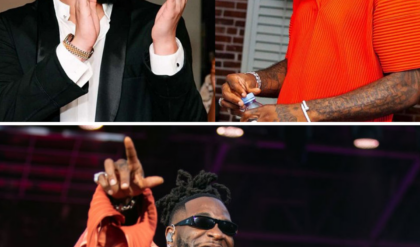Candace Owens STUNS with Bold Proposal: “Ban Brittney Griner? I’d Pick Patriotism Over a Medal ANY DAY”
In a shocking and controversial statement that has sent shockwaves through both the sports world and the public, Candace Owens, the conservative commentator and political activist, has stirred up a firestorm of debate with her recent proposal to ban WNBA star Brittney Griner. Owens, known for her outspoken opinions on politics, culture, and sports, has never been one to shy away from making bold, headline-grabbing remarks. However, her latest comments about Griner and the broader issues of patriotism, national pride, and sportsmanship are sparking intense reactions across the board.
Owens, in a recent interview, was asked about the importance of patriotism in sports, particularly when it comes to athletes representing their country on the international stage. Instead of focusing on traditional views of national pride, where winning is paramount, Owens took a radically different approach. She claimed that she would “rather have a player who LOVES America than a medal,” drawing a sharp contrast between the pursuit of athletic achievement and the values she believes should be at the heart of American sports.
“I’d pick patriotism over a medal ANY DAY,” she emphasized. “It’s not about winning. It’s about representing the country’s TRUE spirit. It’s about honor, about showing what it means to be American, not just on the court, but in every aspect of life.”
But what really set the internet ablaze was Owens’ direct comment on Griner, who recently made headlines for her high-profile detainment in Russia and subsequent return to the U.S. after a prisoner swap. Owens suggested that Griner, who has been open about her political views and outspoken in her criticisms of the country at times, was not the ideal figure to represent the nation.
The crux of Owens’ argument centers around her belief that athletes should prioritize the love and respect for their country over their personal or political opinions. In her view, having a player who may be “less safe” or “less skilled” but fully committed to representing America’s values is far more valuable than someone who may excel in their sport but does not align with those principles.
“We would rather have the less safe player who is the most patriotic,” Owens asserted, suggesting that there’s a difference between athletic talent and the intangible qualities that define an athlete’s true character. For Owens, patriotism is non-negotiable, and it seems that any player who does not embody these values is unworthy of representing the United States, regardless of their abilities.
The Backlash: A Divided Reaction
Owens’ comments have already sparked a whirlwind of responses from both supporters and detractors. On one side, critics of Griner and her political stances argue that Owens’ remarks are valid, especially considering Griner’s public views on social justice and her controversial statements in the past. To these individuals, Owens’ call for patriotism is a reminder that athletes should be mindful of their roles as representatives of the country.
On the other hand, opponents of Owens’ perspective view her suggestion as problematic and overly simplistic. Many believe that an athlete’s worth should be measured by their talent, dedication to the sport, and the values they demonstrate through their actions, not simply by their political opinions. For Griner’s supporters, her experiences, both in the U.S. and abroad, show the complexity of being an athlete in a politically charged world. They argue that her voice and her activism are part of the broader conversation about what it means to represent America in the modern era.
Some have pointed out that Owens’ remarks fail to recognize the nuanced role athletes like Griner play in advancing important social conversations. From fighting for LGBTQ+ rights to bringing awareness to racial injustice, athletes often serve as symbols of change and progress, which some feel is just as important as sports achievements themselves.
The Bigger Picture: What Does Patriotism Mean?
Owens’ comments tap into a larger national conversation about what patriotism truly means in 2024. For many, especially in the political and cultural sphere, the idea of what it means to love one’s country has become highly polarized. Is patriotism about unwavering loyalty, or is it about striving for the country’s improvement, even through criticism?
This philosophical debate isn’t new but has become increasingly pronounced in recent years. For some, the desire to see athletes show unqualified support for the U.S. is tied to a desire for unity, national pride, and a clear, unapologetic allegiance to American values. For others, the real symbol of patriotism lies in holding the country accountable and striving to make it better.
Owens’ comments are certainly provocative, challenging not only the definition of patriotism but also the role of athletes in society. If nothing else, her remarks open the door to deeper discussions about the intersection of sports, politics, and national identity. What does it mean to represent the United States? Is it about winning at all costs, or is there a more complex, layered understanding of what it means to truly honor one’s country?
Conclusion: A Debate That Won’t Die Down
Candace Owens’ call to “pick patriotism over a medal” and to ban Brittney Griner has undoubtedly sparked a polarizing conversation. Whether one agrees with Owens’ perspective or not, the statement highlights the ever-present tension between sports and politics. At the heart of her comments lies a deeply personal vision of what it means to be an American, and this vision is one that will likely continue to resonate with some while being fiercely debated by others.
As the conversation unfolds, it will be fascinating to see how the public continues to weigh the value of athletic prowess against the ideals of national pride and patriotism. For now, Owens’ comments will undoubtedly remain a topic of intense discussion, and her call for a redefined approach to American sports will continue to challenge how athletes are viewed and what they are expected to represent.





